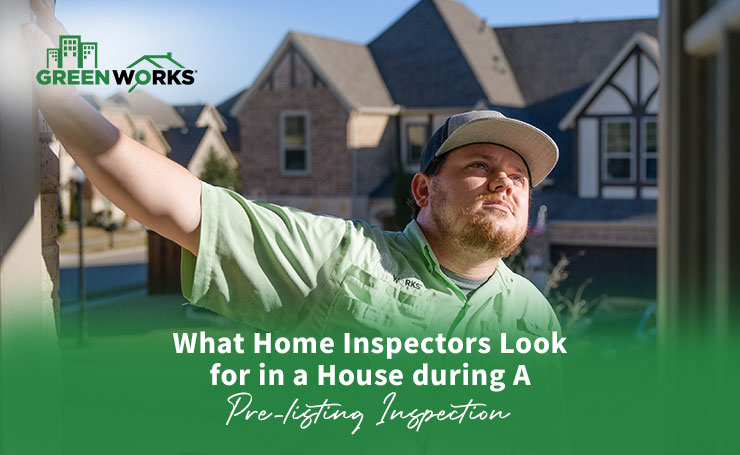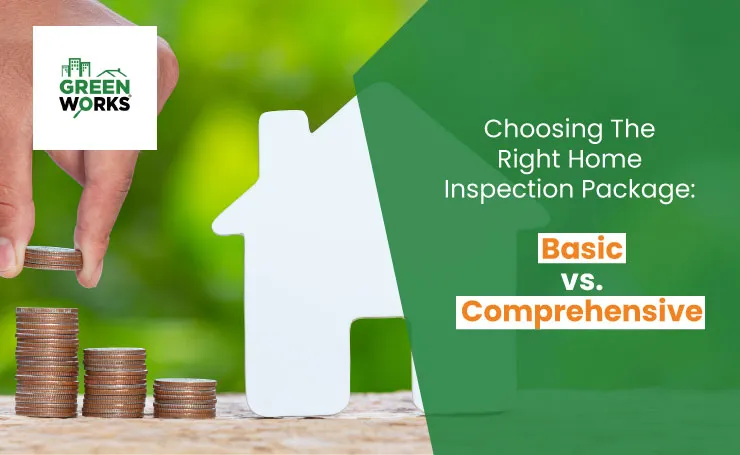Posts

What Home Inspectors Look for in a House during A Pre-listing Inspection
A Texas professional home inspector is essential when conducting pre-listing inspections to thoroughly evaluate the state of a house before it is put on the market. During these inspections, the professional home inspector aggressively inspects numerous parts of the property in search of particular signs that could affect its marketability and worth. Their skilled eye inspects the entire house for potential problems, from the foundation to the roof and everywhere in between, ensuring that the sellers know of any required maintenance or repairs. Professional home inspectors assist sellers in putting their houses in the best possible light and increasing their appeal to potential purchasers by aggressively pointing out areas of concern. Below, we will talk about some of these areas of concern.
Structural Integrity
It is essential to identify any potential structural flaws to ensure the security and long-term stability of the home for both the seller and future buyers. Professional home inspectors prioritize determining a house’s structural soundness during pre-listing inspections because it serves as the foundation for the entire property. The total stability and soundness of the building’s framework, including the foundation, walls, floors, and roof, is called structural integrity.
Inspectors carefully evaluate numerous components related to structural integrity using their knowledge and experience. They carefully inspect the foundation, looking for cracks, shifting, or settlement signs that might point to deeper issues. Any irregularities or flaws in the foundation could profoundly affect the entire building, such as problems with how doors and windows close, uneven floors, or wall cracks.
Additionally, inspectors look for evidence of sagging, leaning, or water damage in the walls. They aggressively look for any exterior and interior visible fissures that might point to structural movement or settling. Additionally, they check the stability of load-bearing walls and look for any indications of moisture intrusion or termite damage that can jeopardize the structure’s integrity.
Another critical component of the structural assessment involves the floors. The drooping, unevenness, or excessive bouncing that may indicate problems with the floor joists, subflooring, or support beams are aggressively sought after by inspectors. They could also look out for indications of pest infestation or water damage that could undermine the floor structure.
Examining the roof is equally crucial to determining a house’s structural integrity. Any indications of a leaking roof, missing or damaged shingles, or sagging rooflines are carefully sought out by inspectors. These problems might need to be addressed immediately to stop further harm because they might point to weak structural elements like rafters or trusses.
Foundation and Basement
During pre-listing inspections, professional home inspectors aggressively prioritize looking at a house’s foundation and basement. Since these elements are crucial to the entire structure, any potential problems might significantly impact the property’s worth, usefulness, and safety.
Inspectors actively look for indications of foundation shifting, settling, or cracking. They closely inspect the inside and exterior foundation walls, checking for any cracks, gaps, or bulges that are readily apparent. Inspectors can assess the severity of the problem and suggest the best courses of action for repairs or additional expert evaluation by actively spotting these problems.
Because basements are frequently concerned with water incursion, inspectors actively look for moisture or water damage indications. They search for moisture, mold development, water stains, or efflorescence on the walls or floors. Additionally, inspectors examine the windows in the basement and any sump pumps or drainage systems to ensure they are in good working order.
In addition to visual inspection, inspectors may actively find hidden moisture or potential leaks beneath the foundation or basement walls using technologies like moisture meters or thermal imaging cameras. This preventative strategy assists in locating future problems that may not be obvious to the unaided eye.
Inspectors also check the structural soundness of the basement. They actively search for any indications of sagging beams, cracks in support columns, or termite or other pest damage. They also evaluate the general condition of the basement floor, looking for cracks or unevenness that might point to problems with the underlying foundation or settling.
Heating, Ventilation, and Air Conditioning (HVAC)
During pre-listing home inspections, professional home inspectors aggressively prioritize assessing the Heating, Ventilation, and Air Conditioning (HVAC) system. A home’s HVAC systems are critical to maintaining indoor air quality and providing comfort, so prospective purchasers must be confident in their effective functioning.
Inspectors examine the HVAC system actively, beginning with the heating element. They aggressively search for indications of wear, damage, or dysfunction when they evaluate the furnace or heating system. This includes inspecting the burners, heat exchangers, filters, and thermostats for damage. To make sure the system works effectively and distributes warm air uniformly throughout the home, inspectors may also test it by turning on the heat.
Another vital component that home inspectors look at is ventilation. They examine the fans and ductwork in the ventilation system actively. Inspectors search for any indications of obstructions, damage, or improper installation that can obstruct the home’s ventilation and airflow. To secure the removal of extra moisture and odors, they might also make sure that spaces like bathrooms, kitchens, and laundry rooms have adequate exhaust systems.
The HVAC system’s air conditioning portion is also actively evaluated by inspectors. They carefully examine the air conditioner, looking for any indications of damage, leaks, or ineffective operation. Inspectors may evaluate the condenser, evaporator coils, refrigerant levels, and electrical connections. To ensure the house is suitably cooled, and the air is evenly distributed, they could also test the air conditioner by turning it on.
Electrical and Plumbing Systems
Professional home inspectors aggressively prioritize the assessment of the plumbing and electrical systems during pre-listing home inspections in Texas. These two critical components greatly influence a property’s functioning, safety, and convenience, making a comprehensive assessment necessary for prospective buyers.
To ensure the electrical system complies with safety requirements and is operating correctly, inspectors actively evaluate it. They carefully search for any indications of obsolete wiring, overloading, or improper installations as they inspect the electrical panel. Circuit breakers, fuses, and grounding systems are all inspected. They may also evaluate outlets, switches, and lighting fixtures to ensure they work correctly and pose no dangers.
Another vital component that home inspectors actively investigate is the plumbing system. They carefully search for any leaks, evidence of water damage, or insufficient water pressure as they inspect the drainage and water supply systems. The condition of pipes, particularly those that are visible and reachable, as well as the connections to fixtures like sinks, toilets, and showers, are evaluated by inspectors. They might also examine the efficiency of water heaters, drains, and shut-off valves.
Inspectors regularly evaluate plumbing fixtures to see if they are present and if they are in excellent functioning order. This involves checking the efficiency of the sinks, showers, toilets, and faucets and ensuring everything is linked correctly and free of problems like leaks or clogs.
Are you in need of top-notch home inspection services in Texas? Look no further than GreenWorks Inspection! Our team of experienced professionals is ready to provide thorough and reliable inspections for your real estate investment. Schedule your inspection today to receive expert guidance and detailed reports. Don’t compromise on the quality of your home inspection. Choose GreenWorks Inspection for a seamless and trustworthy experience. Contact us now to ensure peace of mind for your Texas property.




